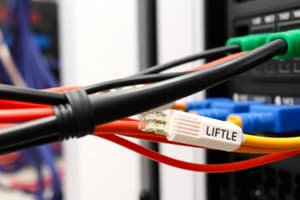Podcast
Questions and Answers
Which type of cable is commonly used in industrial settings due to its durability and resistance to harsh conditions?
Which type of cable is commonly used in industrial settings due to its durability and resistance to harsh conditions?
- Aluminum cable
- XLPE cable (correct)
- PVC cable
- Armored cable
In what type of environments are flame-retardant cables often used?
In what type of environments are flame-retardant cables often used?
- Schools
- Offices
- Data centers (correct)
- Retail stores
What factor should be considered when selecting an appropriate fuse for an application?
What factor should be considered when selecting an appropriate fuse for an application?
- The type of load (correct)
- The length of the fuse
- The color of the fuse
- The shape of the fuse
What is the main purpose of armored cables?
What is the main purpose of armored cables?
Which type of cable is a cost-effective alternative to copper cable?
Which type of cable is a cost-effective alternative to copper cable?
What type of signals are control cables used to transmit?
What type of signals are control cables used to transmit?
What is the main purpose of fuses in electrical systems?
What is the main purpose of fuses in electrical systems?
Which type of fuse is commonly used in residential applications and consists of a thin wire or strip of metal embedded within a glass or ceramic casing?
Which type of fuse is commonly used in residential applications and consists of a thin wire or strip of metal embedded within a glass or ceramic casing?
Where are cartridge fuses often used, and what distinguishes them from cleat-type fuses?
Where are cartridge fuses often used, and what distinguishes them from cleat-type fuses?
What is a characteristic of solar fuses that distinguishes them from other types of fuses?
What is a characteristic of solar fuses that distinguishes them from other types of fuses?
When are resettable fuses commonly used?
When are resettable fuses commonly used?
What type of fuse is a hybrid between cleat-type fuses and cartridge fuses, offering advantages of both designs?
What type of fuse is a hybrid between cleat-type fuses and cartridge fuses, offering advantages of both designs?
Study Notes
Understanding Cables and Fuses
Cables and fuses are essential components of our electrical systems, ensuring safe and reliable power delivery. In this article, we'll delve into the world of these elements, exploring the differences between various types of cables and fuses.
Fuse Types
Fuses are responsible for interrupting current flow in the event of an overload or short-circuit, preventing damages to equipment or causing fires. There are several types of fuses, each with distinct characteristics:
- Cleat-type fuses are commonly used in residential applications and consist of a thin wire or strip of metal embedded within a glass or ceramic casing. The fuse element melts when it reaches its current-carrying capacity, stopping the current flow.
- Cartridge fuses have a metal-encased wire that melts to break the circuit when the current exceeds its rated value. These fuses are often used in industrial settings and have a higher current rating than cleat-type fuses.
- Solar fuses are designed specifically for photovoltaic systems and feature a low-resistance interface to minimize voltage drop.
- Resettable fuses can be reset after tripping and are used to protect sensitive electronic equipment such as computers and audio equipment.
- Semi-enclosed fuses are a hybrid between cleat-type fuses and cartridge fuses, offering advantages of both designs, and are widely used in commercial applications.
Types of Cables
Cables are the lifelines of our electrical systems, transmitting electrical power from the source to equipment. Here are some common types of cables:
- PVC cable is a flexible, low-cost cable with a polyvinyl chloride (PVC) insulation and is commonly used in domestic applications.
- XLPE cable has an enhanced insulation made from cross-linked polyethylene (XLPE), providing greater durability and resistance to water and chemicals. These cables are widely used in industrial settings where exposure to harsh conditions is common.
- Armored cable has a protective covering made of steel wires, providing additional strength and resistance to mechanical damage. This type of cable is often used in areas where there is a risk of cable damage, such as in construction sites, warehouses, and industrial plants.
- Aluminum cable is a cost-effective alternative to copper cable, and its use is increasing due to its lower cost and greater thermal conductivity.
- Flame-retardant cables include materials with inherent flame-retardant properties, making them safer in the event of a fire. These cables are often used in high-risk environments such as hospitals, airports, and data centers.
- Control cables are used to transmit low-voltage signals, such as those required by motor starters, sensors, and other control devices. These cables have a smaller diameter and are often more flexible than power cables.
Fuse Selection and Cable Sizing
Proper fuse selection and cable sizing are critical to ensuring the safety and reliability of an electrical system. To select the appropriate fuse for a given application, consider the following factors:
- Maximum fault current
- Type of load (resistive, inductive, or capacitive)
- Frequency of short-circuits and overloads
- Requirements of the application
Similarly, when selecting cables, consider:
- Current rating
- Insulation type
- Temperature rating
- Mechanical strength
- Flexibility
- Ampacity
- Cost
By following these guidelines and understanding the basics of fuses and cables, you can ensure the safety and reliability of your electrical systems. Solar Fuses Types of Fuses Types of Electrical Cables Fuse Selection and Cable Sizing
Studying That Suits You
Use AI to generate personalized quizzes and flashcards to suit your learning preferences.
Description
Explore the world of cables and fuses, including different types of fuses such as cleat-type, cartridge, solar, resettable, and semi-enclosed fuses. Learn about various cable types like PVC, XLPE, armored, aluminum, flame-retardant, and control cables. Dive into the importance of proper fuse selection and cable sizing in electrical systems.




